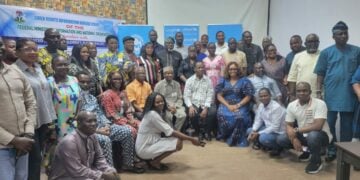The World Bank Group has emphasized that for Nigeria to achieve steady growth and prosperity, both federal and state governments must take critical steps to ensure the country’s security, political stability, and the rule of law. The bank has also called on authorities to invest in human capital, particularly in children, unleash the potential of private investment, promote job creation, and ensure access to finance. Additionally, the bank has stressed the importance of clarity and consistency in policy and regulatory spaces to provide certainty for investment decisions.
Vice President Sen. Kashim Shettima, speaking at the 16th Annual Banking and Finance Conference in Abuja with the theme “Nigeria’s Economic Growth and Empowerment: The Role of The Financial Services Industry,” called for stronger partnerships with experts in the banking and finance industry to accelerate the economic turnaround, as the Tinubu administration mobilizes stakeholders for the repositioning of the economy.
World Bank Country Director, Mr. Shubham Chaudhuri, delivered a presentation titled “Nigeria at Critical Juncture: Charting a New Course” at the Bankers’ Conference. He highlighted that Nigeria has the potential to become a global giant with the right mix of policies. Professor Chaudhuri pointed out that the nation’s young population could help convert this potential into opportunities for younger generations to play a significant role on the global stage.
However, Nigeria has struggled to sustain its growth potential, with public spending remaining low. The World Bank representative emphasized that Nigeria needs to increase its annual GDP spending to stimulate economic activities, suggesting a range of 15 to 20 percent, while the current spending stands at around 12 percent. Nigeria’s spending on health and education is also comparatively low, with health spending even less than that of Mali.
Chaudhuri noted that Nigeria’s removal of fuel subsidies could increase government revenue by 2 to 3 percent. He urged authorities to boost credit lending to the private sector to reach 15 percent, as access to finance remains a significant obstacle for micro, small, and medium enterprises in Nigeria.
Acting Governor of the Central Bank of Nigeria, Folashodun Shonubi, expressed concerns about Nigeria’s economic contribution and stated that the country should aim to do more to contribute to its growth. He called on bankers to actively participate in economic development and advocated for the institute to take a more active role in advocacy.
Vice President Shettima, in his remarks titled ‘Our Priorities in a Post-Pandemic World,’ emphasized the need to turn the economy around quickly and sought the partnership of the banking and finance industry in achieving this goal. He emphasized that their support was essential and should not be taken for granted.





